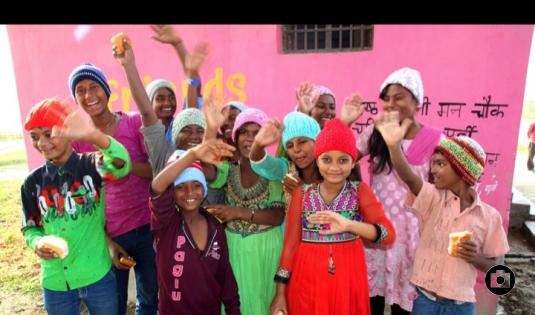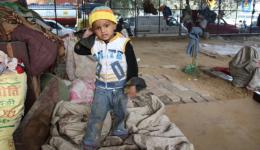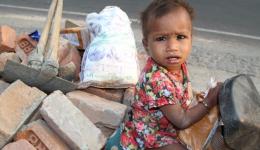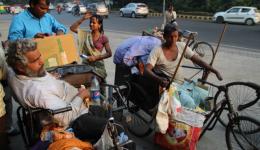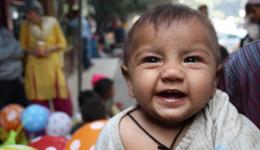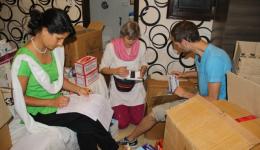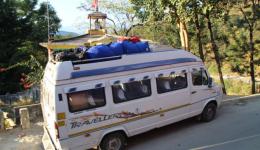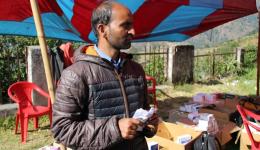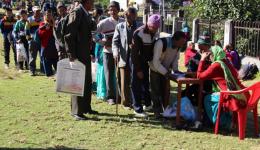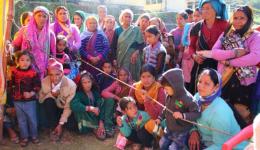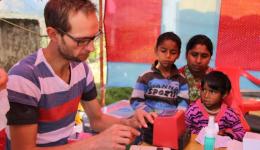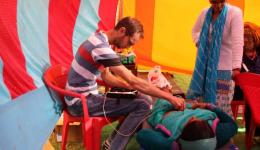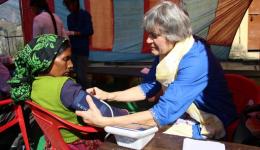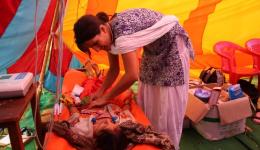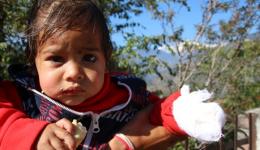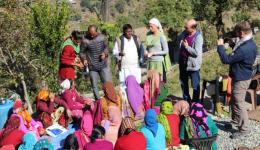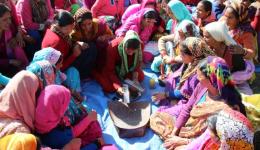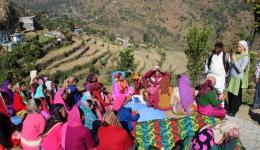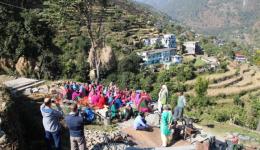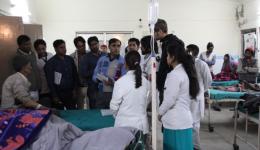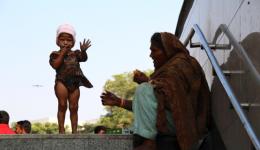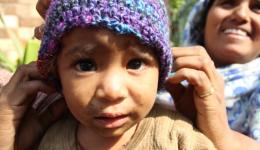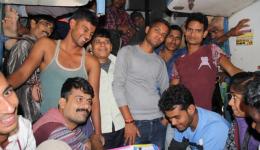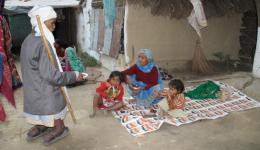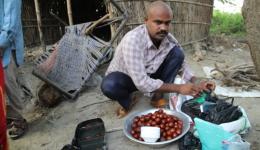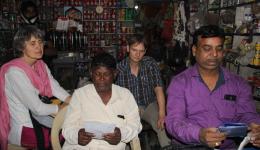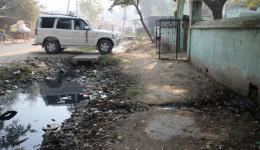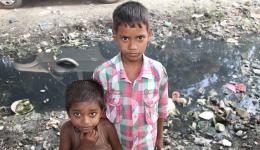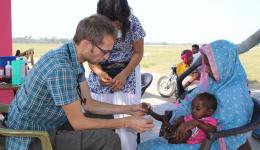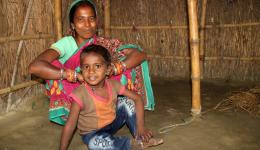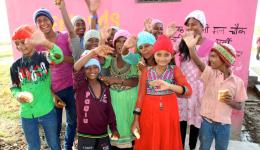Registered Nonprofit
Association for the Support
of Children and Needy
People Around the World
Unterstützung
Medical Camp and other projects
Thur, Jan. 10, 2017 - 10:10pm, written by Alexandra,published by Frank
Last photos of the trip online
Before continuing with many photos and a detailed report of the current trip by the team Katrin, Ingrid and Erni, here is a supplement of the penultimate journey of November / December 2016.
Together with many Indian helpers, many hundreds of blankets were distributed. Although this year the cold is not as threatening as in years before, the warm blankets help to avoid all kinds of diseases following the hard life on the road. Especially for toddlers and elderly people this is an indispensable help...
Wed, Dec. 28, 2016 - 8:10am, written by Alexandra, published by Frank
THINK YELLOW-PINK ;-)
The school children of Chakia radiate almost like small adults, when we visit the colony in November 2016. It is hardly believable how bleak the situation had been when our team first visited the village in February 2011. At that time large timid eyes peered from dusty faces, the small bodies were wrapped in rags. It was then necessary to make it clear to the leprosy affected parents that their healthy children have a right to go to school and that this only will have a positive effect on the future of the entire leprosy village.
It was not until the next day (2011), when a conversation with the teacher showed that the children would be allowed to attend the school provided they appeared clean and tidy, that the parents dared to believe the impossible, i.e. that their children one day will be like all other children in town.
Today, more than four years later, we want to share the joy of these young people in the photos with ALL who together with us believed in their future!
Pictures say more than words and show us that FriendCircle WorldHelp is able to trigger a wave of enthusiasm which makes our hearts beat faster...
THANKS for EVERYTHING...for the many years of common friendship, hope, confidence and the courage to continue to believe in wonders, that can come true every day!
Sun, Dec. 25,2016 - 09:40am, written by Alexandra, published by Frank
Chakia- a Christmas story
When in 2013 our team set up a medical camp in the leprosy village Chakia in Bihar, a small child attracted our attention.
The mother told us that he is three years old. His appearance was that of a one-and-a-half year old. His weight was life-threatening low. In addition to baby milk and, above all, high quality protein, the mother also received from Michael further prescriptions for tonics for the little boy such as vitamin preparations.
The photo shows the boy at age three and now at age six, together with his happy mother.
Pictures:
Little Amal at age three with his mother in 2013- in a completely undernourished conditions.
Little Amal at age six with his mother in Mutter 2016 - THANKS to ALL friends at home who by their contribution make such miracles come true.
Mon, Dec. 12, 2016 - 8:40pm, written by Alexandra, published by Frank
Hand pumps for clean water
When in the evening it grows too dark for work in the leprosy colonies, we use the time to do various shopping. Here we buy two hand pumps with accessories for two villages which will promote clean water from a deep borehole. It is not unusual for people here to not only consume poor quality drinking water but the drinking water is even visibly brown.
Thur, Dec. 9, 2016 - 9:05am, written by Alexandra, published by Frank
A new kidney for Manushek
Early in the morning, a father and his son are standing in front of the hotel’s rooms. They hold out notes towards us with the names of doctors and a diagnosis. Our day is already full with many program points and unforeseen incidents might disturb our schedule. "One thing at a time", an inner voice warns. This encounter surely also has its meaning...
In Venu’s and Ramavaraj’s room the two men explain that one of the sons of the family is seriously ill and needs an expensive kidney transplant which is unaffordable for poor families. We promise to visit the boy tomorrow on our way to another nearby leprosy colony.
When we arrive the next day, a 23-year-old young man is sitting on a camp bed. His back is curved, his hands are swollen. Despite his natural Indian skin, he looks pale. He freezes, is wrapped in a blanket. One after the other the boy’s family members introduce themselves. The atmosphere is very oppressive although all try to be particularly hospitable with us.
The young man’s mother tries to tell us in Hindi how much the family is suffering from the condition of Manushek. She tries in vain to suppress her tears.
For a moment we struggle to keep our composure.
When such moments overpower us, it is necessary to hold on inner visions of equanimity and strength. The suffering of many people on earth is as infinite as time itself and for new light and energy to enter the fate of those affected in such situations we have to trust firmly in a positive future of these people. One such example may be a nurse who is always trying to do her best, and does not get sick herself because she knows that she would then no longer be able to help anyone anymore. And if we let ourselves be overcome by sadness we would miss the chance of seeing new hope in the faces after some time.
Slowly, patiently and step by step we try to discuss the situation on an objective level. We want to know how much money has been collected so far for the operation and are told that the Indian state will pay half of the cost, i.e. 2,5 Lakh rupees, equivalent to approx. 3470,00€. In order to pay the monthly costs for the dialysis, the father who is himself a leprosy sufferer, took a credit of more than 1500€. This debt will give the family headaches for a very long time.
The elder brother would like to be the donor of a kidney. After the results of further lab examinations in the hospital of Lucknow will be known, the doctors will decide whether the mother or he could be the donor.
We touch Manushek’s hand, With a pain-distorted face, he withdraws it powerlessly. Deep inside we are sure that he will be well again...
"Don’t cry!" we tell the family lovingly but confidently. "Your positive attitude and your firm belief that everything will be okay is now what Manushek really needs."
The check for the second half of the money required for the operation is filled out. The mother trembles, and begins to weep bitterly. Her crying and shouting do not end. For a few minutes, the only thing that fills space and time is the painful cry of a mother that vent her feelings.
We get into the car. Silence. We know that on our journeys learning will never stop. Terms such as "alien and familiar", "near and far", "now and later", "important and unimportant" lose their meaning and merge into one.
Serious gap between rich and poor
Not only in India – all over the world, the gap between rich and poor is a major obstacle to harmony and peace. Many poor people are blamed for non-cultivation, greed, dishonesty, lack of hygiene, etc. But is this really their fault?
Are they not rather a part of our society that is missing and should be rediscovered?
On its journeys, FriendCircle WorldHelp experiences daily what it means to build bridges; bridges that make eyes sparkle - and this represents only the visible part of what is going on deep inside people.
Both sides are concerned: The one who receives support and the other one who believes to help.
This statement seems to contain a contradiction, as it takes a critical view of what “help” means.
In fact, the true value of the material part which is given to the needy only corresponds to the highest inherent value if given with a compassionate heart. This makes both sides richer and, above all, happier.
With the following photos, we would like to show you how much love and tenderness is in every knit of our knitting ladies’ caps. The energy and sense of responsibility towards people who are not our immediate neighbors are finding their way. And this changes the world of those who are receiving …
THANKS to ALL at home who by their unlimited compassionate commitment and precious donations made so many eyes sparkle...
Sun, Dec.4, 2016 - 8:52am, written by Alexandra, published by Frank
In Bihar – one of India’s poorest states
The next station where our team will stay for several days is Motihari and its surrounding villages. Motihari is in Bihar, the state which is regarded as the poorest and at the same time the most unstable in India. About 104 million people (according to the census 2011) per square kilometer live in this area of approx. 95,000 kilometers which means an average of 1102 persons per square kilometer. This is the highest population density of all Indian states and nearly three times the average Indian population of 281 inhabitants per square kilometer. The literacy rate is also the lowest in India. Only some 63.8% of Bihar’s population can read and write (men: 73.4%, women 53.3%) (see Wikipedia).
Leprosy victims are even worse off in social and financial terms than the rest of the population because they are not given employment due to disability and/or sequelae of leprosy and/or for discrimination reasons. One of the principles of FriendCircle WorldHelp is to always look for the poorest of the poor and give them support. Therefore, our team will visit five leprosy villages in the coming days to evaluate their problems, resp. review the progress of projects already started, and to take further steps towards the development of the villages.
Doors to keep burglars and wild animals away
First we visit Bhairoganj a village which Katrin and Claudia had visited for the first time in August 2016. At that time, the inhabitants were happy to get a much needed hand pump to pump up clean ground water, which as we can see still works perfectly carrying a lot of clean water.
Another difficulty the people are struggling with had also already become known during the last tour, but the solution had been postponed for lack of time: The doors and windows which are either not existing or about to decay over time are a cause of concern. At night, thieves and wild cats sneak into the rooms and steal whatever food they can find while people are sleeping. Every handful of rice must be begged during the day to ensure survival. All the harder it is for the inhabitants if their few possessions are repeatedly lost due to lack of the simplest safety precautions. FriendCircle WorldHelp decides to start with doors for the 28 huts.
In an old, impressive antique-looking forge, doors made of iron are ordered. They are custom-made by hand and after completion installed in the uneven door sections of the rooms. For the small forge, the production of the 28 doors is a major order which will be started the next day already. There is still the question of how to settle the invoice, the main problem on this trip. This handicraft workshop probably has so far never accepted or cashed a check like the one we offer. This will be the first time and so the amount of an equivalent of 1500 € - a fortune for this workshop – is written on the paper …
Untimely death
Unlike in other leprosy villages, the disorder in Bhairoganj immediately strikes us. Our question about the reason for this causes grave concern in the faces. We are told that "Ashok, the example of the village is in a depression". He was just on the river to pray. About two weeks ago his wife died at the birth of the fourth child. "Ashok adored his wife", we are told and now at the age of 29 he has to provide alone for the three young children. Fortunately, the grand-parents are still alive and helping a lot.
When we ask to see the children, an old frail woman who is holding the youngest of the three, about two years old, appears. The grandmother smiles affectionately and the countless wrinkles underlining the expression of her face tell of life. Besides her stands her husband, two and a half heads smaller than her, about the same age. With his knees he stands on short wooden boards which seem to replace shoes. Less than half of his lower legs serve as feet. Leprosy has deformed his body.
Both make a composed impression trying to conceal as much as possible the grief over their son’s sorrow. The baby has fever. It cries and clings to Grandma. Once more we admire the bravery of Indian souls. As so often, we are facing the incredible human strength to endure suffering and at the same time the grace in the eyes of those concerned. At this sight we fall silent.
When Ashok some time later takes a seat in front of us we see a young man whose tears do not end. It becomes clear: Ashok is a supporting pillar for the whole village and above all now most urgently needed by his children.
Firmly believing that Ashok will more easily overcome the difficult times when he sees hope for his family and the village, we tell him that we need his help – with everything! For ordering the doors, shipping and handing out sweets to the children, and thinking about how the seven young men of the village can earn money so that they do not have to beg anymore. In addition, we plan to build channels to dry up the cloaca of the unsanitary, smelly ponds which have been used to drain the wastewater and which are a further cause for the spread of diseases.
Ashok stops crying. We can see how strongly he is prepared to fight against his pain and for the good of his village and his children. In the following hours, Ashok is everywhere: when purchasing, negotiating the prices for the iron doors and the discussion with the man who is to play an important role in the future development of the colony. Ashok himself had the idea and made the contact to the person who can provide the village with a large space for a monthly rent to operate a sorting system for garbage. The young men of the colony already have some experience with this, Ashok says and explains that the purchase, sorting and resale of rubbish could result in a monthly salary of up to 6000 rupees (about 83€) per family. This would mean a tremendous progress for the entire leprosy colony. In addition to begging, the boys are currently earning some 1,50€ per day with collecting garbage. The owner of the place is very friendly and assures us his full support even though we have to postpone the start of this project to a next visit due to the tense financial situation.
Ashok later hands out the sweets that the children were eagerly awaiting, and now and then a short smile flits across his sad face. In these few hours that we were allowed to get to know the people of the Bhairoganj colony, a connection has developed that will last long.
When poverty gets a face, it is no longer anonymous but becomes binding. Responsibility turns into compassion and from compassion love evolves for all those who want to help themselves but do not have the means to do so. But love is capable of everything ...
THANKS for ALL friends at home for your love, compassion and sympathy – these will bring about a positive change to many worries and needs ...
Thur, Dec. 1st, 2016 - 12:00, written by Alexandra, published by Frank
Completion of projects in the Himalayan - team 1 returning home – onward journey to Bihar
Visiting patients in the hospital. Return journey to Delhi
After the medical camp, the distribution of caps in a school and the initiation of the homework project for 100 women, our team is now on its way to Sri Nagar, where a team of physicians of the university hospital promised us full support at the start of our tour in the mountains.
Of the 600 patients who came to the medical camp, ten were admitted to the hospital for surgery. The cost of surgical measures is borne by the hospital. FriendCircle WorldHelp bears the cost of the tests preceding surgery and the necessary drugs.
The photo shows a ward. At the bed of each of the ten patients, Michael catches up with the Indian physicians on the current condition, the test results and discusses the further procedure ...
Fortunately, the patients in this hospital get their daily meals for free. In many other hospitals the relatives have to pay for the meals of the patients, which is often very difficult, especially for poor families. For example, if a riksha driver who earns some 1,50 € per day has to go to hospital, family members often camp outside the hospital door. In addition to the loss of earnings of the sick person, people below the poverty level have no health insurance. The family members then have to pay also for the medicine, as otherwise there is no treatment. The follow-up costs of an operation or the necessary medication often add up to some 200€ to 300€, which is why many families have to run into debt for a long time. For us it is a mystery how people succeed to cope with such situations …
We would like to pass on the joy, the relief and great gratitude of the people who found help at the medical camp and the surgery, to ALL our friends at home. Again and again, relatives of the patients contact Negi und Manju who continue to be the contact persons, to express their great gratitude for the help ...
Farewell in Delhi from team 1
Back in Delhi we have to say goodbye with a heavy heart to part of our team. Michael and Christina are flying back to Germany.
While the rest of the crew is busy with preparations for the next part of the journey, we continuously meet people on the street who are overjoyed to get one of the warm woolen hats. In Elisabeth's big red bag there are always caps of different sizes for any upcoming need ...
Next section – journey to Bihar
At the beginning of the next section of our journey we are first worrying a bit whether we will be able to continue our projects in view of the current difficult money situation. In the Himalayan mountains it had already been quite difficult to persuade business people to accept one of the old bank notes which will be completely invalid as per the beginning of 2017.
Until December 31st, the notes can still be converted into new money, but only up to a certain amount. For any excess, both private and business people need to give evidence of the origin of the money, and this makes it so difficult.
We are aware that the situation in Bihar, our next destination, will not be any better. Like so often recently we have to take one step after another and believe that we will be helped.
With the help of hotel staff members we get train tickets 3rd class, in non-AC compartments. We are glad, however, the trip will be exhausting since this train will have to stop everywhere for 2nd class trains and air-conditioned ones which have priority. From Indian friends we get here and there small bundles of 100 rupee bank notes which help to bridge the train ride.
At the platform, Adil distributes some caps to poor people. On the train we sit in a compartment togethe with different people who think to have booked the same place as we have. Fortunately at night we can stretch out on our couches and sleep a little during the 32 hour journey.
The next morning our train is stormed and overrun by hundreds of young men. What does this mean, we ask ourselves. The men are pushing politely but determinedly into our compartment, and take a seat beside us so that we are now even more closely packed together.
After repeated questioning, Venu learns that all of these boys have applied to the Indian military but were rejected. They now want to return to their states, home. Of course they have no money for tickets. The conductor who controls the tickets had already been there but even if he came again he would not have a chance against this crowd.
Patiently we wait for the moment when we will get more space in the compartment. Venu uses the time by telling the young men of FriendCircle WorldHelp. Spontaneously, two of them offer their help saying that whenever their help would be needed, they would be available
Sun, Nov. 27, 2016 - 4:57pm, written by Jürgen and Alexandra, published by Frank
New project: Homework for widows and distressed families
After completion of the two-day medical camp our team visits a group of hundred women. Since the heavy flood catastrophe of 2013 when at least 10,000 died, many of these women lost their husbands. The flow of tourists to the Kedarnath Mountain and the temple of the same name stopped abruptly and two years later only a few people find their way there again. The locals had no job anymore and only a few of them found work in helping on a daily basis with the construction of roads and bridges by the government, by which they earn now and then some 100 rupees (1,30 €) per day.
The women are hardworking in the garden, household etc. as much as they can to provide their families with the necessary food and clothing.
In case something unforeseen occurs, for example if medication is needed or a child wants to learn a profession, they are in great distress.
FriendCircle WorldHelp decides to give these women the opportunity to earn some money each month by doing homework.By producing smoking cones which in addition to rods are very popular in India they can each earn some 3000 rupees per month = approx. 42,00€. This will help to alleviate at least the greatest distress.For this purpose we buy in Delhi a mixing machine, a large scale and a shredding machine. With these devices the women can process the herbs and tree trunks they collect in the mountains into a moist mass which is then pressed to cones by manual equipment and dried in the sun.Afterwards, the cones are packaged in boxes and sold on the market.
Sat, Nov. 26, 2016 - 6:15pm, written by Jürgen and Alexandra, published by Frank
Report of the medical camp
600 patients treated within two days
On the morning of November 12, the medical camp starts. Negi and Manju have rented two tents for FriendCircle WorldHelp and have had them built on the school grounds of Ukhimath; one for examinations and treatments, the other one for old and weak people to rest. The patients are given numbers and are sitting patiently in the queue after having already walked for four or five hours from their villages to Ukhimath. Two nurses from the area assist Michael and Christina for the examinations. Venu translates the concerns of the patients from the local language into English. Elisabeth measures blood pressure and glucose level. Christina makes the preparations for ECGs and manages the dispensary. In the afternoon of the first day, an Indian doctor from the local hospital spontaneously offers his support. He had heard about the medical camp by the son of a patient. On the second day as well he helps diligently so that Michael and his colleague during these two days were able to examine over 600 patients, provide them with medication and send a few of them to the university hospital of Sri Nagar to undergo necessary surgery.
Because of the long queue, patients repeatedly try to push into the doctor’s tent. However, a rope and Adil as security guard ensure the necessary distance. After each treatment, the patients receive one of the warm caps of our knitting ladies. Sunny, Jürgen and our driver provide tea and food for the patients, so that all are properly taken care of ...
Late in the evening, the bus driver drives the people back to their home villages as they would have to walk at least three to four hours in the dark which is too dangerous in the mountains due to wild animals.
The joy of the patients can hardly be expressed in words. Many told Venu that such a medical camp in their region had so far never taken place. Also our new Indian doctor friend is very satisfied and announces his voluntary collaboration for the future.
The next day, 10 patients are admitted in the university hospital to undergo surgery in the following days. The surgery is free of charge, the cost of the drugs are taken over by FriendCircle WorldHelp. Negi reports in the following days how much people are impressed and how they repeatedly thanked with folded hands. None of them had expected this help …
THANKS to ALL friends at home! By your support, many people experienced relief and healing!!
Mon, Nov. 11, 2016 - 8:45pm, written by Frank, published by Frank
Back to Delhi - further reports and photos will follow soon
Today the team traveled from Bihar back to Delhi. Since the journey by train with >30 hours had been very lengthy and because of the space conditions very exhausting, for the return journey a domestic flight from Patna was chosen. The seven hour taxi ride over the Indian roads to the Patna airport was the most difficult part, afterwards it was a pleasant trip ... In the early evening the team reported from the hotel in Delhi. Tomorrow, various tasks will be on the agenda and on Saturday, Jürgen, Adil and Elisabeth will fly back home.
Further photos and reports will follow on Saturday at the latest.
Mon, Nov. 11, 2016 - 8:45, written by Alexandra, published by Frank
New photos and reports
Dramatic situation for people on the street
The situation of the beggars and street children has drastically deteriorated as a result of the currency devaluation since people need the small cash themselves to secure their livelihood. Fortunately not too often but here and there we see a long queue of people on the street being served rice and Dal by rich Indians.
In a large supermarket we buy a huge amount of bread and cookies which we distribute under the bridges of Delhi. People there are very happy. Again and again we have our driver stop the bus to hand out of the window our treasures including the wonderful warm caps. There is a great need.
Many people stretch out their hands, sometimes children even jump up on the bus to get more of the delicacies. As we arrive on the places where FriendCircle WorldHelp usually and regularly runs the soup kitchen, we are even allowed to pay with the old bank notes.
Under the bridge we meet a woman whose forearms are broken after a fall and the bones have not grown back properly by lack of proper treatment. Our friend Sunny immediately agrees to take the woman into his care and arrange surgery in the hospital. FriendCircle WorldHelp will bear the cost.
Medical camp in the Himalayas uncertain due to the actual situation
During our stay in Delhi, last preparations for the medical camp in the Himalayas are taking place. For months, it has been made known by radio announcements, newspaper advertisements, flyers and word-of-mouth propaganda that a team of FriendCircle WorldHelp from Germany will arrive. The phone numbers of our friends Negi and Manju had been indicated so that long lists of patients from totally 26 villages was established. Due to the general difficult financial situation in Delhi (with hardly anyone accepting our old bank notes), our team has to consider a short-term cancellation of the camp. When Venu conveys by phone this sad message to Negi and discusses with his friends in the background, everyone is ready to do their best to solve this problem, be it queuing for many hours in front of the banks to change some notes or tell smaller shops of our camp to get here and there valid notes.
Our team is very relieved. Also for us it would have been inconceivable, even tragic, to call off the many patients hoping for relief or recovery. On November 11 at 11pm our 16-seater bus crammed with medical equipment, medication, caps and seven persons finally starts its 16 hour drive to Ukimath in the Himalayas ...
Sat, Nov. 19, 2016 - 7:30pm, written by Frank, published by Frank
By train to Bihar
Good evening, meanwhile, Michael and Christina returned safely to Germany. The rest of the team, i.e. Alexandra, Jürgen, Elisabeth and Adil, are currently travelling by train to Bihar. The official travel time is about 30 hours, but there is actually a delay of several hours.
Since there is no electricity available, their mobile phones are mostly off and there are only short phone calls. We keep our fingers crossed that everything will work out well; also by phone data connection is difficult in the north-east of India. Further photos and reports are ready. As soon as there is an internet connection we will get them ...
New photo above: Arrival of team 2 in Delhi, in the luggage a huge number of woolen caps for distribution. 
Fri, Nov. 16, 2016 – addendum of Nov. 19, 2016
Back in Delhi
After successful days in the mountains with the medical camp and hundreds of treated patients, the team is back in Delhi as of today. At night (German time), Michael and Christina will start their return journey to Germany. The remaining team will travel to Bihar in a few days, according to the plan. The supply of cash will be exciting as after the devaluation/exchange of the large bank notes there is presently still chaos with the banks.
Photos and reports of the past days will follow...
Sun, Nov, 13, 2016 - 6:40pm, written by Frank, published by Frank
Team under way on the foothills of the Himalayas – medical camp and distribution of caps
After a few days in Delhi where they were busy with errands and preparations, the team is currently in the foothills of the Himalayas. Due to the current difficulties with the ongoing changeover of bank notes (without prior notice the major bank notes lost their value overnight), the journey was somewhat delayed. But it finally worked and the team drove by minibus the long distance into the mountains. Near Guptakashi – FriendCircle WorldHelp had visited this are already in winter 2014 - the medical camp is now run. Very many patients could be treated and according to today‘s phone call some had been waiting from early morning until the evening for their turn ...
In addition, the woolen caps brought along are distributed creating much enthusiasm. At night it is already very cold and there are no heaters. So everyone is glad to have a warming headgear!
At nightfall the team drove back to the accommodation. The patients that were last treated were taken in the minibus since nobody wants to walk unprotected at night. There are many wild animals, probably also big cats and bears ...
Photos and further information will follow as soon as possible; presently there is no Internet access.
If you want to find out more about the area, etc. you can watch a video about the journey 2014 in the Youtube channel of FriendCircle WorldHelp. And if you want to learn more about the medical camp, here is e.g. also the link of the activities after the earthquake in Nepal ...
https://www.youtube.com/watch?v=44dHdvc0UWk
https://www.youtube.com/watch?v=X2fgH9RM0mw
Thur, Nov. 10, 2016 - 3:30pm, written by Frank, published by Frank
Two more recent photos
The team is just on the road to buy a huge load of food to hand out to street children. According to latest information from Alexandra the situation due to the currency changeover as described below is difficult since everyone needs their small notes and as a result e.g. the many people on the street get nothing slipped...
Tomorrow they will distribute the caps brought along as well as the just bought food 
Thur, Nov. 10, 2016 -4:10am, written by Alexandra, published by Frank
Arrival in Delhi – start of part 2 of the journey
The events come thick and fast …
After our first team has successfully completed the projects in Nepal, our second team is already arriving in New Delhi today. In the morning Venu picks up Jürgen, Elisabeth and Adil with an excess luggage at the airport.
During one and a half day, Michael and Christina have been searching many medical shops and wholesalers to get the necessary medicine and accessories for the medical camp in the mountains. In the meantime, Alexandra carries out organizational tasks which are also important for the smooth course of the tour.
The exchange of Euro into Rupees has already been done, but now our team has some headaches: In the night from November 8 to 9 the 500 Rupee and 1000 Rupee notes are suddenly worth nothing, though these are the main means of payment here.
All banks are closed for two days and also at the ATM you get no money. Only those who still have a few 50 Rupee or 100 Rupee notes (equivalent to about 70 cents, resp. 1.30€) can buy food, clothing or something else. The news says that this is a measure to counter the many black money and corruption. No other action by the Indian government had helped so far, which is why they had to resort to such a drastic measure. In an official speech to the Indian people, the Indian Prime Minister Modi apologizes for the difficulties that arise from this measure. It is the topic talk these days.
We as foreigners will have no difficulties to convert our money into new notes, but this unforeseen incident delays the tour plan by at least one day.
Fortunately, in our clothes store we can pay for Elisabeth’s clothes by Visa card, after in the first store we were told that they would no longer accept ‘old’ money. The money exchange offices are also refusing – nobody will give away 100 Rupee notes! Today we still get a good meal in our hotel and there is enough mineral water. But we do not know what it will look like tomorrow. We can imagine how the beggars on the street are getting on. Nobody will give them small money today because everybody needs it himself. We give a very gaunt old man a 100 Rupee note which we still have in our pocket. He is very happy because with this he is sure to get at least today a meal at the next street stand.
Back to the latest events in Nepal: everybody and we too are very satisfied: some projects are still in process, others are already completed.
The well in Methinkot demanding the incredibly heavy excavation work of at least one month could be finished. All concrete rings are installed and the ground water begins to fill the well. When the last ring was installed we asked whether the villagers are satisfied with the result, our friend Nawang said: “They are not only satisfied, they are overjoyed. This new well will be a great blessing to the people here!"
For the training center for young people all material was bought and delivered. A competent engineer is assisting the villagers for one month to accompany the construction and complete it professionally and earthquake-proof. We were able to document the start of the work with photos. On our next visit we will report further.
In the gallery you will find many photos of the last days in Nepal. For example, the construction oft he training center, of greenhouses, the well construction and the distribution of caps...
Here is the link to part 1 of the journey:
http://friendcircle-worldhelp.org/de/medical-camp-nepal
